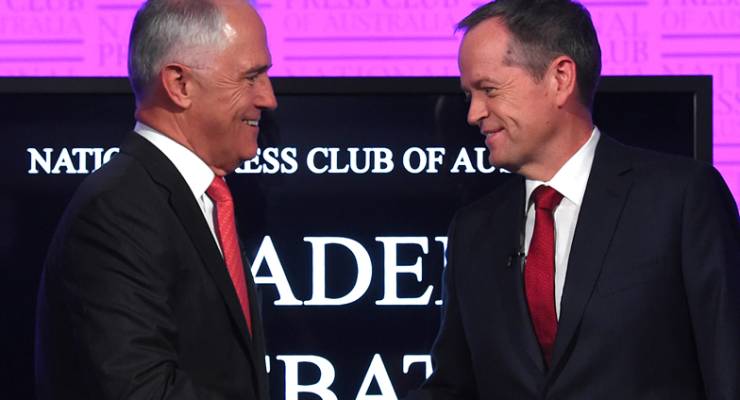
By now you know that last night’s leaders’ debate was a snoozefest, scored variously as a draw or narrow win to Malcolm Turnbull, but more noteworthy for the refusal of either leader to take any risk in actually trying to appeal to voters beyond their campaign strategy and talking points. Viewers switched off, literally, by the hundreds of thousands.
Turnbull, who is most himself in the act of communicating — indeed, in a sense, Turnbull doesn’t fully exist unless he’s bending someone’s ear about something — was more at home and occasionally spoke like an actual human being, albeit sticking closely to his key points (the economy, the economy, the economy, boats, the economy). Shorten started off like the nervous Second Speaker in a Friday night debate on “That Variety Is The Spice of Life” at the local high school, and similarly stuck fast to his messages around health, education and the evils of corporate tax cuts. Perforce, Turnbull was the winner, but on presentation rather than substance, because the only substance was in the questions, not the answers.
The problem with these debates is that, with the stakes so high and the benefits so small, they demand a risk-averse strategy. There’s minimal upside to a strong performance in a debate. Kim Beazley and Mark Latham bested John Howard in their election debates, but it didn’t help them. Only a small fraction of voters watch them, and only a fraction of those are undecided, and only a fraction of those are likely to be influenced by the outcome of the debate, and only a fraction of those are in marginal seats where their decision is likely to make a difference. Contrarily, a gaffe or slip-up in a debate will be replayed endlessly for days afterward and keep on damaging you. And campaigns are all about reinforcing your core messages over and over, every moment in a debate spent freelancing, offering a genuine opinion or answering the question put to you is a moment to hammer your key campaign themes lost.
Only when a leader has nothing to lose are they prepared to go for broke and tear into their opponent — the classic example being Keating taking on John Hewson on A Current Affair in 1993 — having issued a challenge to the Liberal leader that morning to debate the GST. Keating threw the niceties of debate out the window and went after Hewson and didn’t give him a moment’s rest. Neither side is going to try that when the polls are 50-50 or thereabouts. The nearest we got was Shorten’s carefully prepared zinger about leading his party while Turnbull’s led him.
One way politicians can be dislodged from their talking points is if they are in an extended one-on-one interview with an interrogator prepared to keep pressing them until they give a proper answer to a question. Last night’s format had little capacity for the three panellists — Laura Tingle, Andrew Probyn and Ellen Whinnett — to put any pressure on Turnbull or Shorten, even though moderator Chris Uhlmann futilely pressed them to actually answer questions rather than recite talking points.
The other way is to put politicians in front of a live audience of actual voters and have voters asking the questions, so that reliance on talking points, as if it’s just another, particularly well-ordered, press conference, won’t be a good look. For whatever its faults, the Sky News debate in western Sydney two weeks ago had far more content and interest than last night’s slumber party.
The campaign is now in its fourth week. Really, we’ve been in election mode since April; remember when Turnbull was portrayed as a genius for seizing the initiative and recalling parliament for the ABCC bill? If it were a normal campaign, we’d be on the first day of it, with five weeks ahead of us. Instead, even the political media are getting bored, and voters remain resolutely disengaged, which is why the polls remain frozen. Any more of last night’s debates and the electorate will be in a coma.








I expect better from my subscription than this, BK.
I can read any of the above cheap reactions in a daily newspaper.
Re Keating – wish Shorten had a bit of Keating in him. Turnbull left himself wide open on a number of occasions, and I’m sure Keating would have reduced him to a bloodied mess on the floor.
“Political Corsetry” – I reckon Shorten will cost Labor government (in it’s own right) – still a Turnbott well-hung parliament is some consolation.
What disturbed me was after the hand shake at the end when the camera pulled back to frame the whole stage. An ugly head appeared between the audience and Bill Shorten blocking half of Bill’s body. It was Mathias Hubert Paul Corman. What a ham-fisted git!
I didn’t watch much, as watching grass grow in the winter evening was much more entertaining, however I would have liked a question with substance. How about this;
“Mr Turnbull, your policy platform seems to be jobs and growth, although from what I can tell the only plan for jobs and growth that you have is a tax cut. Given that research shows no correlation or causation between corporate tax cuts and growth, and your amusing assumption that corporate behemoths will miraculously invest more if they have a miniscule adjustment to tax, why do you bother persisting with this charade?
Don’t bother, I know the answer to that, the electorate are obtuse on matters economic and political, and charades are more effective than offering nothing.
FO!
It only took viewers a few minutes to realise the format was abysmal – no spontaneous interaction between the two leaders just their scripted lines. Yawn.
Fortunately I’d recorded a 1988 episode of The Bill last week & quickly switched to that. At least the dialogue was original & rang true.